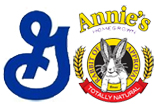FoodBevBiz
News highlights, market trends, and original data analysis related to the U.S. retail food & beverage industry … by Jay Nargundkar
General Mills Buys Annie’s for $820 Million, Gets Backlash for Free

On Monday evening, Annie’s Homegrown announced it had been purchased by General Mills for $820 million, reflecting a 37% premium over its closing share price, and a 51% increase over its average share price over the past month. Annie’s had $204 million in revenue in its most recent fiscal year, and is most famous for its natural and organic macaroni and cheese. It also makes natural/organic cookies, crackers, and other snacks. Although the company will remain independently run from its Berkeley, CA, headquarters, it will now be a part of General Mills’ “Small Planet Foods” portfolio of natural and health-focused brands with Cascadian Farms, Muir Glen, Lara Bar, and Food Should Taste Good.
For General Mills, which had roughly $18 billion in sales last year, a business of Annie’s size has a minimal impact on the bottom line today, but is meant to have a transformative impact on the business in years to come. With Mills’ resources backing it, Annie’s should be able to dramatically ramp up production and expand distribution into many more retail outlets, likely featuring a more competitive price for its products than it currently has. Annie’s will also expand into more product categories and grow its presence in areas like snacks and frozen foods where it currently has a minimal presence.
While this deal is just the latest in a long history of large food and beverage manufacturers snapping up small natural/organic players (e.g. Coca-Cola with Honest Tea, Pepsi with Odwalla, Kellogg’s with Kashi and Bear Naked, Campbell’s with Bolthouse Farms, to name just a handful), it may well be a harbinger of a frenzy of major M&A activity to come in the industry.
One piece advice for the participants in the next such deal: have your social media accounts taken down for “maintenance”, or be prepared to take your lumps. At the time of this blog post’s writing, a few of the posts from just the past half hour on Annie’s Facebook page are quoted below. Hundreds, if not thousands, of earlier comments echo similar sentiments:
“Shame on you Annie’s. I just bought Annie’s fruit snacks the other day for my kids, but after seeing your recent sellout to GM those are going in the trash and my family will not be spending another penny on any of your products.”
“I am so sorry that you have allowed this purchase to transpire. We loved Annie’s. We will no longer be purchasing your products as the support that GM has given to non labeling of GMO’S , I can not trust that they will allow you to maintain your values and honesty.
“Very, very sad to see Annie’s cave to the almighty dollar. It’s not sitting well with your main customer base at all!”
“Good bye. I will not support a company that is part of a GMO-loving, Big Agra corporation! You guys are just sellouts, padding your wallets! If you really cared about providing good food, you’d run far away from evil corporations like General Mills!!!! BOOOOOOOOO!!!!!!!!!”
“I’m stunned. Sickened. How could this happen? Never again will I buy this product. Bad karma is what I say.”
Consumers point to high-profile examples, like Kellogg’s acquisition of Kashi, of a big company “ruining” a small brand it bought by compromising its values. Earlier this year, Kashi — a once-celebrated natural foods brand — announced after pressure from a class-action lawsuit that it would no longer claim to be “all natural” or use “nothing artificial”. Kashi sales have dipped over the past few years and its organization has experienced significant upheaval.
The news isn’t necessarily all bad, though. Presumably General Mills is smart enough not to destroy the value of their new purchase, and other acquisitions of this type have been successful. Quartz touts the 2007 Clorox purchase of Burt’s Bees as a “dream scenario for an indie company acquisition,” noting that not only have Burt’s Bees sales grown at a prolific rate, “the niche brand helped Clorox reshape its supply chain to be more cost-effective and sustainable” — an ideal situation where a bolt-on acquisition didn’t just grow incremental sales, it positively affected the base business too!

